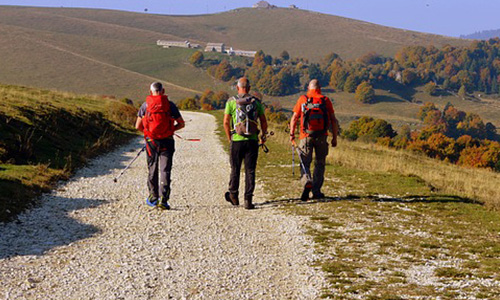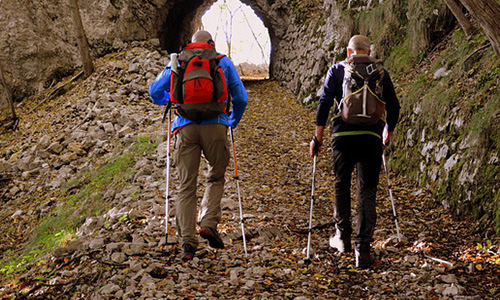Long Distance Walking at Any Age
Author

A keen runner, skier and nuts about cycling. Karl lives in Cumbria, where he loves encouraging his two children to follow in his outdoor lifestyle. Whilst out and about keeping active, Karl keeps a diary and shares it with Outdoor Look.
 Staying fit should be your first concern, no matter how old you are; if you’ve reached 60 or 65 years of age and wondering what to do next. Getting back to nature makes the best answer to your question. Start exploring the environment on your foot once again just the way you do in your 20’s or 30’s. I have encountered numerous hikers, travellers, and pilgrims who are in their 70’s and taking a multiday hiking trip. If they can do it, you can take a step forward for your health too.
Staying fit should be your first concern, no matter how old you are; if you’ve reached 60 or 65 years of age and wondering what to do next. Getting back to nature makes the best answer to your question. Start exploring the environment on your foot once again just the way you do in your 20’s or 30’s. I have encountered numerous hikers, travellers, and pilgrims who are in their 70’s and taking a multiday hiking trip. If they can do it, you can take a step forward for your health too.
Whether you’re a teenager or a 75-years old, training is the mantra to stay fit and healthy at all ages. Just remember, you don't need to walk for hours, be regular and enjoy the journey.
- Wisely Build Your Endurance
To begin with your training, start walking daily, keep a record of the distance covered and route followed. Share your data and results with your grandkids, practice partners, or friends as it will support your efforts. Keeping a record of your training will be beneficial in the future.
Robbie Johannesen, a retired physical therapist advises senior hikers to stay hydrated during and after walks. You can search complete workout training plans on the internet, most of them recommend adding time and miles on a weekly basis. Add more rest intervals on a challenging day.
- Work to Strengthen Your Core
Your legs and core muscles have to be strong to walk for hours. In order to prevent the compression of your spine and the problem of backache, you should work to strengthen your core. Activities that will help strengthen your core include water aerobics, yoga, pilates, and swimming.
- Try Walking Poles
 A strong core assists in balancing your body on a rough terrain and so do trekking poles. They help ease your step, reducing pressure on your ankles and knees, assists you to step forward, helps you determine the roughness of the surface, and prevents you from losing balance. Start building your arm strength to handle a trekking pole on mud, rock, or asphalt.
A strong core assists in balancing your body on a rough terrain and so do trekking poles. They help ease your step, reducing pressure on your ankles and knees, assists you to step forward, helps you determine the roughness of the surface, and prevents you from losing balance. Start building your arm strength to handle a trekking pole on mud, rock, or asphalt.
- Practice Silently
Walking or training with friends helps time pass, practice silently and prepare yourself for long-distance walking. Spending time with yourself and nature is necessary to stay motivated at all times. You can keep a notepad with yourself, pen down the things that amazed you in a particular day and how it feels to be staying healthy at an old age. Share your experiences with your grandkids and family to motivate them.
- Test Your Ability
Don’t forget to test your ability and performance. Check how much distance you’ll be able to cover in two to three hours of a new trail. Initially carry a lightweight backpack, gradually start adding weight to it, use poles on different terrains to test the strength of your core, arms, and legs.
Fitness trainers always recommend stopping as early as your body starts giving indications. Don’t stick to your schedules when you feel exhausted. Take proper rest and start again.
Author

A keen runner, skier and nuts about cycling. Karl lives in Cumbria, where he loves encouraging his two children to follow in his outdoor lifestyle. Whilst out and about keeping active, Karl keeps a diary and shares it with Outdoor Look.
Categories
- Sport (28)
- Product Reviews (3)
- Team Outdoor Look (7)
- Mike Wild (2)
- Mike Payton (2)
- Suse Hammond-Pears (3)
- Snowboarding (12)
- Latest Offers (105)
- Shop Talk (1)
- Competitions (7)
- Walking (413)
- Lifestyle Fashion (8)
- Travel (86)
- Kit Guides (176)
- Workwear Clothing (6)
- Safety Workwear (4)
- Health/Fitness (289)
- Skiing (91)
- Great Outdoors (1316)
- Cycling (92)
- January 2025
- December 2024
- November 2024
- October 2024
- September 2024
- August 2024
- July 2024
- June 2024
- May 2024
- April 2024
- March 2024
- February 2024
- January 2024
- December 2023
- November 2023
- October 2023
- September 2023
- August 2023
- July 2023
- June 2023
- May 2023
- April 2023
- March 2023
- February 2023
- January 2023
- December 2022
- November 2022
- October 2022
- September 2022
- August 2022
- July 2022
- June 2022
- May 2022
- April 2022
- March 2022
- February 2022
- January 2022
- December 2021
- November 2021
- October 2021
- September 2021
- August 2021
- July 2021
- June 2021
- May 2021
- April 2021
- March 2021
- February 2021
- January 2021
- December 2020
- November 2020
- October 2020
- September 2020
- August 2020
- July 2020
- June 2020
- May 2020
- April 2020
- March 2020
- February 2020
- January 2020
- December 2019
- November 2019
- October 2019
- September 2019
- August 2019
- July 2019
- June 2019
- May 2019
- April 2019
- March 2019
- February 2019
- January 2019
- December 2018
- November 2018
- October 2018
- September 2018
- August 2018
- July 2018
- June 2018
- May 2018
- April 2018
- March 2018
- February 2018
- January 2018
- December 2017
- November 2017
- October 2017
- September 2017
- August 2017
- July 2017
- June 2017
- May 2017
- April 2017
- March 2017
- February 2017
- January 2017
- December 2016
- November 2016
- October 2016
- September 2016
- August 2016
- July 2016
- June 2016
- May 2016
- April 2016
- March 2016
- February 2016
- January 2016
- December 2015
- November 2015
- October 2015
- September 2015
- August 2015
- July 2015
- June 2015
- May 2015
- April 2015
- March 2015
- February 2015
- January 2015
- December 2014
- November 2014
- October 2014
- September 2014
- August 2014
- July 2014
- June 2014
- May 2014
- April 2014
- March 2014
- February 2014
- January 2014
- December 2013
- November 2013
- October 2013
- September 2013
- August 2013
- July 2013
- June 2013
- May 2013
- April 2013
- March 2013
- February 2013
- January 2013
- December 2012
- November 2012
- October 2012
- September 2012
- August 2012
- July 2012
- June 2012
- May 2012
- April 2012
- March 2012
- February 2012
- January 2012
- December 2011
- November 2011
- October 2011
- September 2011
- August 2011
- May 2010
- April 2010
- March 2010
- February 2010
- January 2010
- November 2009
- October 2009
- September 2009
Submit a Comment